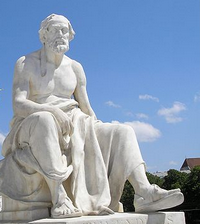Last weekend I attended a conference in San Antonio on the relevance of Thucydides' "History of the Peloponnesian War" to the practice of contemporary American foreign policy. Sponsored by the Liberty Fund, the conference's motivating concept and focus was the relationship between democracy and empire in Thucydides. The conference attendees included scholars of several stripes, including War College faculty, former policymakers from the Bush administration and prominent think tank fellows. This was no dry academic conference focused on textual minutiae. Rather, it was intended to give policymakers -- and those who educate policymakers -- space for thinking about what Thucydides can teach us about the conduct of the international affairs of the United States.
Thucydides is nearly ubiquitous in the serious and general study of American foreign policy. Although we lack good statistics for how often particular texts are taught in graduate or undergraduate courses, nearly every professor of international relations I spoke to at the conference confessed to teaching Thucydides to undergraduates, and most remembered first reading selections from "History of the Peloponnesian War" as undergraduates. But the study of Thucydides extends to graduate and policy programs as well. At the Naval War College, students are required to read Thucydides in their first course, with additional study available. Thucydides also appears on syllabi in required courses at the Army War College. It has been argued that the study of Thucydides was particularly important in neoconservative circles connected with the University of Chicago.
Consequently, almost everyone involved with either the professional study or formulation of foreign policy is familiar with some parts of Thucydides. As 2,400-year-old texts go, this level of penetration puts "History of the Peloponnesian War" in company only with the Bible. Most people's exposure to Thucydides comes through the Melian Dialogue, a pithy account of a brutal Athenian massacre of the inhabitants of the island of Melos. The Melian Dialogue is generally taught as an introduction to the unsentimental view of politics adopted by Realist theory, although some professors teach it as an indication of the degradation of Athenian democracy. International relations scholars also focus on the first book, in which Thucydides appears to give a realist account for the causes of war, typified in the claim, "The real cause I consider to be the one which was formally most kept out of sight. The growth of the power of Athens, and the alarm which this inspired in Sparta, made war inevitable."

